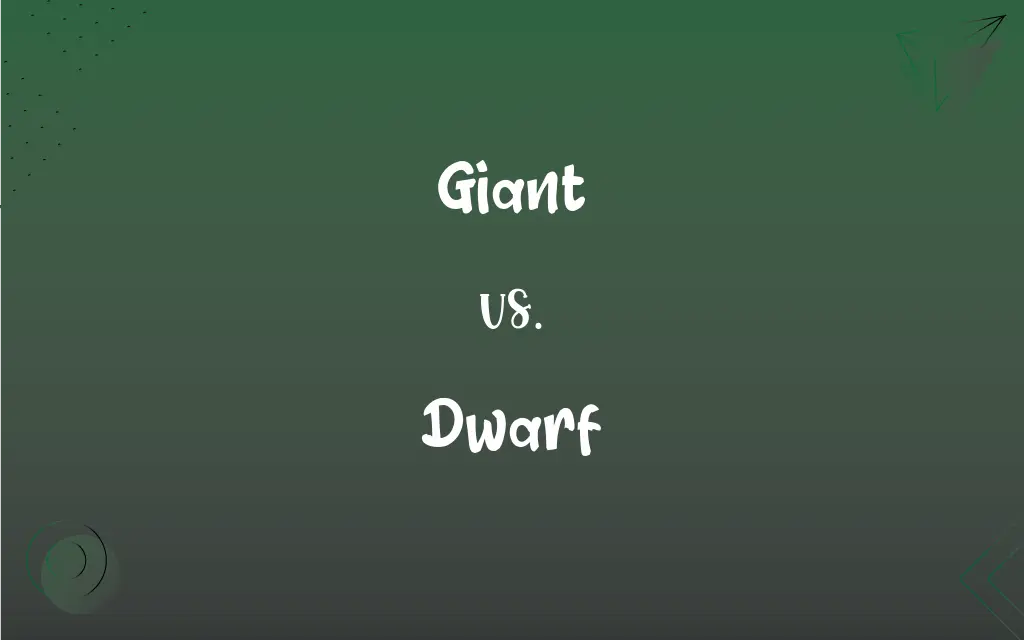Giant vs. Dwarf: What's the Difference?
Edited by Aimie Carlson || By Janet White || Updated on October 18, 2023
A "giant" refers to something extremely large or powerful, while a "dwarf" indicates something much smaller than usual.

Key Differences
In mythology and folklore, a giant is often a colossal being, possessing great strength and often depicted as antagonistic or benign. They appear in various cultures' stories, towering over humans and landscapes. Conversely, a dwarf in similar contexts is a smaller-than-average person, sometimes with magical attributes, and is often associated with underground habitats or certain professions, such as mining.
In the realm of astronomy, the terms giant and dwarf have specific meanings. A giant star, like a red giant, is a large star that's often nearing the end of its life cycle, having exhausted its primary fuel. On the other hand, a dwarf star, like our Sun, is a main-sequence star or even a white dwarf, which is the remnant core of a once-larger star.
When describing everyday objects or entities, a giant typically denotes something much larger than the average or standard size. For instance, a giant tree would significantly tower over its counterparts. Meanwhile, the term dwarf would indicate something much smaller than the average, like a dwarf plant that remains small even at maturity.
In literature and media, giants are often used metaphorically to represent powerful entities or insurmountable challenges. A company dominating its industry might be termed a "corporate giant." In contrast, dwarfs might symbolize underdogs, or sometimes, due to their mythical association, a source of wisdom or mysterious knowledge.
Biologically, the term dwarf can refer to animals or plants that are smaller because of genetic factors. For instance, dwarf rabbits are a specific breed smaller than typical rabbits. A giant, in similar contexts, would refer to species that are considerably larger than their counterparts, like the giant squid.
ADVERTISEMENT
Comparison Chart
Mythical Context
A colossal, often powerful being.
Smaller-than-average person, sometimes with magical traits.
Astronomy
A large star, often nearing its life's end.
A main-sequence or white star, smaller in comparison.
Everyday Usage
Something much larger than average.
Something much smaller than average.
Metaphoric Use
Represents power or dominance.
Represents the underdog or mysterious wisdom.
Biological Reference
Species considerably larger than their counterparts.
Animals or plants smaller due to genetic factors.
ADVERTISEMENT
Giant and Dwarf Definitions
Giant
A powerful and influential person or organization.
The company became a tech giant in just a decade.
Dwarf
Something smaller than average or typical size.
She planted dwarf sunflowers in her garden.
Giant
Something impressively large or powerful.
The discovery was a giant leap for science.
Dwarf
A mythical being, smaller than a human, often linked to magic.
The dwarf revealed a secret passage in the mountain.
Giant
A person or thing of great size.
Dwarf
A star smaller than the main-sequence, like a white dwarf.
The white dwarf shone brightly in the night sky.
Giant
A person or thing of extraordinary power, significance, or importance
A giant in the field of physics.
Automotive industry giants.
Dwarf
To make something appear small by comparison.
The skyscraper dwarfed the surrounding buildings.
Giant
Greek Mythology One of a race of humanlike beings of enormous strength and stature who were destroyed in battle with the Olympians.
Dwarf
A person with a usually genetic disorder resulting in atypically short stature and often disproportionate limbs.
Giant
A being in folklore or myth similar to one of these beings.
Dwarf
An atypically small animal or plant.
Giant
A gymnastic maneuver in which the body is swung, fully extended, around a horizontal bar.
Dwarf
A small creature resembling a human, often having magical powers, appearing in legends and fairy tales.
Giant
Marked by exceptionally great size, magnitude, or power
A giant wave.
A giant impact.
Dwarf
A dwarf star.
Giant
A mythical human of very great size.
Dwarf
To check the natural growth or development of; stunt
"The oaks were dwarfed from lack of moisture" (John Steinbeck).
Giant
(mythology) Specifically:
Dwarf
To cause to appear small by comparison
"Together these two big men dwarfed the tiny Broadway office" (Saul Bellow).
Giant
Any of the gigantes, the race of giants in the Greek mythology.
Dwarf
To become stunted or grow smaller.
Giant
A jotun.
Dwarf
(mythology) Any member of a race of beings from (especially Scandinavian and other Germanic) folklore, usually depicted as having some sort of supernatural powers and being skilled in crafting and metalworking, often as short with long beards, and sometimes as clashing with elves.
Giant
A very tall and large person.
Dwarf
A person of short stature, often one whose limbs are disproportionately small in relation to the body as compared with typical adults, usually as the result of a genetic condition.
Giant
A tall species of a particular animal or plant.
Dwarf
An animal, plant or other thing much smaller than the usual of its sort.
Dwarf tree
Dwarf honeysuckle
Giant
(astronomy) A star that is considerably more luminous than a main sequence star of the same temperature (e.g. red giant, blue giant).
Dwarf
(star) A star of relatively small size.
Giant
(computing) An Ethernet packet that exceeds the medium's maximum packet size of 1,518 bytes.
Dwarf
Miniature.
The specimen is a very dwarf form of the plant.
It is possible to grow the plants as dwarf as one desires.
Giant
A very large organisation.
The retail giant is set to acquire two more struggling high-street chains.
Dwarf
(transitive) To render (much) smaller, turn into a dwarf (version).
Giant
A person of extraordinary strength or powers, bodily or intellectual.
Dwarf
(transitive) To make appear (much) smaller, puny, tiny.
The newly-built skyscraper dwarfs all older buildings in the downtown skyline.
Giant
(gymnastics) A maneuver involving a full rotation around an axis while fully extended.
Dwarf
(transitive) To make appear insignificant.
Bach dwarfs all other composers.
Giant
Very large.
Dwarf
(intransitive) To become (much) smaller.
Giant
A man of extraordinari bulk and stature.
Giants of mighty bone and bold emprise.
Dwarf
To hinder from growing to the natural size; to make or keep small; to stunt.
Giant
A person of extraordinary strength or powers, bodily or intellectual.
Dwarf
An animal or plant which is much below the ordinary size of its species or kind.
Giant
Any animal, plant, or thing, of extraordinary size or power.
Dwarf
A diminutive human being, small in stature due to a pathological condition which causes a distortion of the proportions of body parts to each other, such as the limbs, torso, and head. A person of unusually small height who has normal body proportions is usually called a midget.
Giant
Like a giant; extraordinary in size, strength, or power; as, giant brothers; a giant son.
Dwarf
A small, usually misshapen person, typically a man, who may have magical powers; mythical dwarves were often depicted as living underground in caves.
Giant
Any creature of exceptional size
Dwarf
To hinder from growing to the natural size; to make or keep small; to stunt.
Even the most common moral ideas and affections . . . would be stunted and dwarfed, if cut off from a spiritual background.
Giant
A person of exceptional importance and reputation
Dwarf
To become small; to diminish in size.
Strange power of the world that, the moment we enter it, our great conceptions dwarf.
Giant
An unusually large enterprise;
Walton built a retail giant
Dwarf
A person who is abnormally small
Giant
A very large person; impressive in size or qualities
Dwarf
A legendary creature resembling a tiny old man; lives in the depths of the earth and guards buried treasure
Giant
Someone or something that is abnormally large and powerful
Dwarf
Make appear small by comparison;
This year's debt dwarves that of last year
Giant
An imaginary figure of superhuman size and strength; appears in folklore and fair tales
Dwarf
Check the growth of;
The lack of sunlight dwarfed these pines
Giant
A very bright star of large diameter and low density (relative to the Sun)
Dwarf
An animal or plant that's smaller due to genetics.
The dwarf rabbit became her favorite pet.
Giant
Of great mass; huge and bulky;
A jumbo jet
Jumbo shrimp
Giant
A being of great size and strength in mythology.
The village lived in fear of the mountain giant.
Giant
An entity significantly larger than others of its kind.
The giant oak tree stood alone in the field.
Giant
A star of significant size, especially in its late stages.
The red giant could be seen through the telescope.
FAQs
Can "dwarf" be used as a verb?
Yes, "to dwarf" means to make something appear small by comparison.
Are giants always antagonistic in myths?
No, while some giants are depicted as foes, others are benign or even helpful.
How does a giant star differ from a regular star?
A giant star is often larger and is usually in the later stages of its life cycle.
Are all small stars considered dwarf stars?
No, only specific stars, like main-sequence stars or white dwarfs, fall into this category.
Is "giant" always about size?
While often related to size, "giant" can also imply power, influence, or significance.
Can a discovery be a giant leap?
Yes, a significant or groundbreaking discovery can be termed a "giant leap."
How are dwarfs typically portrayed in myths?
Dwarfs in myths are often linked to magic, wisdom, and underground habitats.
Are giant animals real?
Yes, some species, like the giant squid, are considerably larger than their counterparts.
Do dwarfs always have magical abilities in stories?
While common in some tales, not all portrayals of dwarfs grant them magical traits.
In business, what's a corporate giant?
It's a company that dominates its industry due to its size and influence.
Can a plant be a dwarf?
Yes, dwarf plants are varieties that are smaller, often due to genetics.
Do people use "dwarf" in a derogatory way?
The term can be derogatory when referring to people with certain medical conditions. "Little person" is a preferred term.
In fiction, can a dwarf be of average human height?
In fiction, the characteristics of dwarfs can vary, but they're traditionally depicted as shorter than humans.
Are there giant plants?
Yes, some plants, like giant sequoias, are much larger than their species' average.
Is a dwarf galaxy smaller than other galaxies?
Yes, dwarf galaxies are smaller and have fewer stars compared to larger galaxies like the Milky Way.
Are dwarf planets smaller than all other planets?
Dwarf planets are smaller than major planets but might still be larger than some celestial bodies.
Do giant waves exist?
Yes, giant waves, often called "rogue waves," can form in oceans and are much larger than surrounding waves.
What's a white dwarf in astronomy?
A white dwarf is the remnant core of a once-larger star, now compact and dense.
Is a "giant" cookie just a big cookie?
Yes, in everyday language, a "giant" cookie would be much larger than a typical one.
Can "giant" refer to achievements?
Yes, a significant achievement can be termed a "giant feat" or "giant step."
About Author
Written by
Janet WhiteJanet White has been an esteemed writer and blogger for Difference Wiki. Holding a Master's degree in Science and Medical Journalism from the prestigious Boston University, she has consistently demonstrated her expertise and passion for her field. When she's not immersed in her work, Janet relishes her time exercising, delving into a good book, and cherishing moments with friends and family.
Edited by
Aimie CarlsonAimie Carlson, holding a master's degree in English literature, is a fervent English language enthusiast. She lends her writing talents to Difference Wiki, a prominent website that specializes in comparisons, offering readers insightful analyses that both captivate and inform.































































